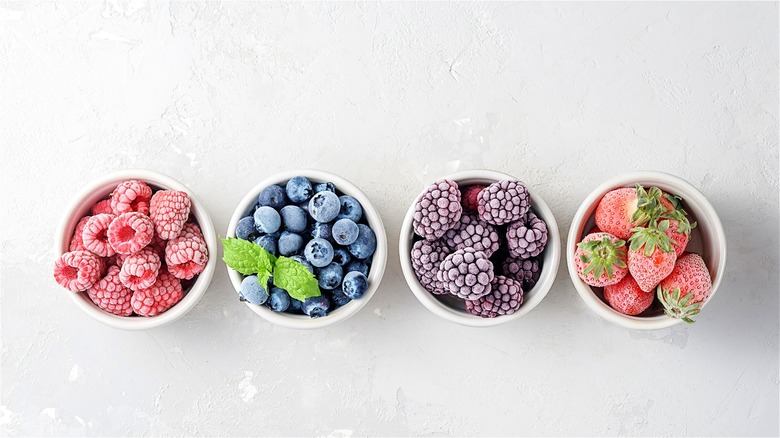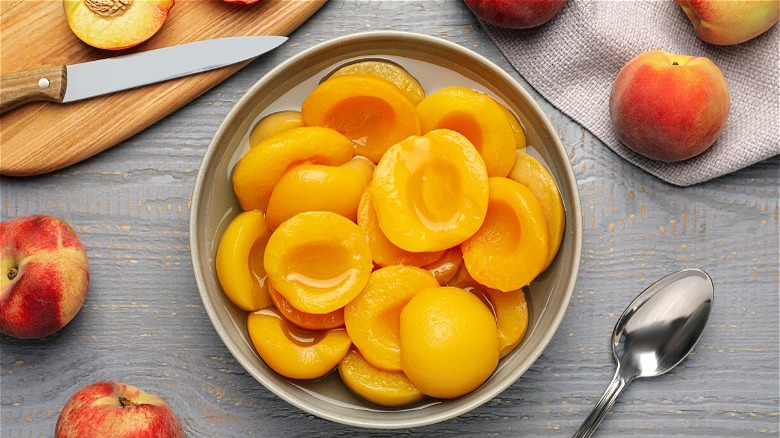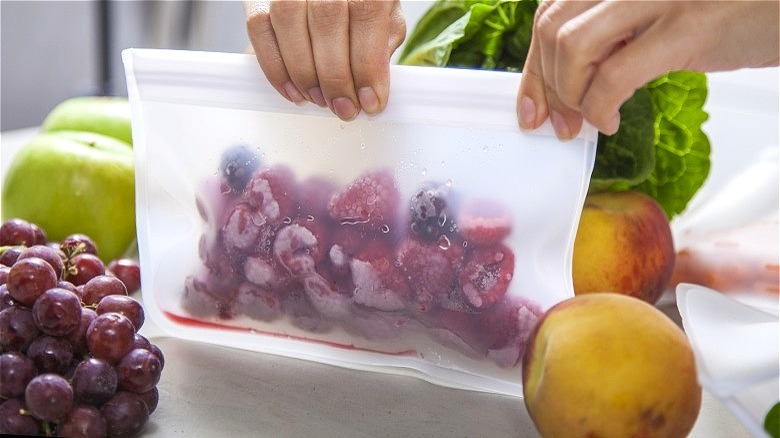For Maximum Nutrients, Frozen Fruit Is A Better Buy Than Canned
Regularly consuming a variety of fruits not only imparts excitement and pleasure to your taste buds but regularly chomping down on nature's candy fuels your body with essential nutrients. Fruits are not only nutritious but come in a plethora of colors, shapes, and sizes. When making an epic fruit salad, you can choose whatever fits your fancy or opt to use some of the 25 fruits Good Housekeeping considers to be the most nutritious such as kiwis, mangoes, and apples.
According to the USDA, most fruits contain a certain number of nutritional benefits like vitamin C, potassium, and fiber. While most Americans won't argue the nutritional perks of eating fresh fruit, the reality is, in 2015 only 12% of CDC-surveyed Americans met their daily fruit intake. The Greater Pittsburgh Community Food Bank claims fresh produce is often the most expensive grocery sector due to the extensive health benefits of fruits and vegetables. If you want to get the most for your money, you may be considering opting for frozen or canned fruit instead. Before we delve into the nutritional differences between each option, it's important to know some of the benefits of purchasing frozen or canned produce instead of fresh fruit directly from the grocery store.
The benefits of purchasing frozen or canned fruit
When considering the differences between fresh, canned, or frozen fruit, it's important to not only look at the cost comparison but to look at the shelf-life when choosing one variety over another. The cost of fruit proves to be a tricky subject since shelf-life plays a role in whether or not you end up eating what you purchased. According to The Boston Globe, fruit seems comparable in price no matter how it's prepared, yet food waste remains an important element in this equation.
Based on research from RTS, each American wastes up to one pound of food per day. Unfortunately, fruit makes up some of this unprecedented waste: One 2020 survey conducted by the Washington Red Raspberry Commission via OnePoll concluded that the average fruit consumer wastes $520 of fresh fruit each year (per SWNS). This may play a deciding factor in price if you usually end up tossing some of your fresh fruit each week. When looking at storage capabilities, Good Housekeeping claims canned fruits have a shelf-life of one to two years depending on the fruit's acidity. According to A Sweet Pea Chef, frozen fruit lasts as long as nine months depending on a few external factors like freezer temperature. In pivoting to consider the nutritional differences between canned and frozen fruit, all in all you may be looking for more frozen fruit recipes to get the most for your money and your health.
Why frozen fruit is more nutritious than canned
If you plan on making old-fashioned peach cobbler, any peaches will make a delicious dessert, but when it comes to the health benefits of fresh, frozen, or canned fruit, there may be small nutritional differences causing you to favor your frozen options more. According to chef Barry Tonkinson, director of development at the Institute of Culinary Education, canned fruits often taste muted compared to fresh or frozen varieties (via Insider). They also often come with added ingredients like sugary syrups making them less nutritious than their fresh counterparts. Former food science researcher at the University of California Davis, Diane Barrett, describes how fresh fruit is blanched before being frozen, and exposed to heat only for a few minutes while the canning process comes with a more intense heating process which can reduce or impact the nutrients of specific fruits (per the BBC).
The Boston Globe does point out that while the canning process can degrade vitamin C and several B vitamins, the remaining nutrients stay intact in canned form while vitamins A and E are comparable to fresh and frozen versions of the same fruit. Also, if you're worried about added sugars, Kosher.com suggests purchasing canned fruits packed in their own juice or avoiding ones packed in sugar-based syrups. While the American Diabetes Association claims frozen fruit is packed in its most nutritious state, canned fruit can also be healthy as long as you are reading labels to avoid those pesky added sugars.


